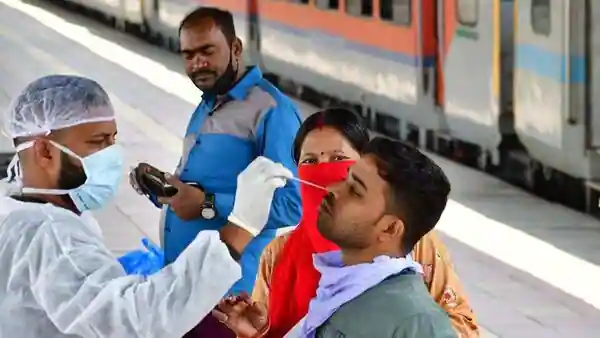After a brief lull in the spread of covid-19, several European and Asia-Pacific countries recorded severe spikes in infections earlier this month. Despite high vaccination cover, South Korea, Germany, Austria and New Zealand even registered their highest single-day infection counts ever. Yet, India just resumed regular overseas flights and is all set to end official containment measures this week. Are we really safe from the latest global wave?
True, all three pandemic waves in India were preceded by similar global surges. Like the current hotspots, India, too, has a high vaccination rate, and studies anyhow doubt the full efficacy of vaccines against Omicron, the variant fuelling the surge. But epidemiologists largely do not see India at immediate risk of another wave for some time to come.
For one, the country just saw through its third wave without much damage. That surge was already dominated by the Omicron variant, with its sub-lineages BA.1 and BA.2. Secondly, having been widely exposed to the virus already, India is different from South Korea and New Zealand, which had stayed protected so far. “India seems to be protected by hybrid immunity through significant exposure to covid-19 during the second wave and increasing vaccination coverage,” said Ramanan Laxminarayan, director of Center for Disease Dynamics, Economics & Policy (CDDEP).
No wonder, infections have declined rapidly despite rising complacency in covid-appropriate behaviour. On 27 March, India reported its lowest infection count in 23 months. But despite the optimistic tones, epidemiologists also warn that risks remain and India must be ready for new variants since the virus keeps mutating.
Sequencing woes
To achieve that, India still needs to ramp up genomic sequencing, the key to identifying new variants, even as vaccinations continue, epidemiologists said. Last year, South African scientists were lauded for identifying Omicron in time. But a similar feat from India is tougher: its sequencing rate is agonisingly poor ().
India has sequenced just 0.36% of its covid-positive samples and takes an average 59 days between detecting a positive sample and reporting the variant, far slower than most countries with high caseloads. If a variant were to emerge in India, the world may be clueless until after two months have passed.
Genome sequencing needs investment and training, but a low healthcare budget has left India wanting, experts say. Investing more will also have future benefits. “Increasing genome sequencing capacity has broader effects on improving public health and will help us address challenges that will arise even after covid,” said Gautam Menon, professor of physics and biology at Ashoka University.
Jab priorities
Several countries have started giving booster shots, and so has India to 60-plus citizens and frontline workers. But the Centre is reportedly considering boosters for all adults, even though epidemiologists continue to stress on double-dose vaccination coverage first to keep severe disease and hospitalization at bay.
While studies have shown that antibodies wane with time after two shots, the immune memory persists and gives lasting protection. “Booster doses for the elderly and those with comorbidities will help prevent severe disease as their immunity response is generally compromised,” said Giridara Gopal Parameswaran, a post-doctoral researcher at CDDEP. “But implementing a booster for a wider share of the population should be backed with adequate research and data.”
Even 11 months after India’s vaccination drive opened up for all adults, 16% of the 18+ population are still not fully vaccinated, and the second-dose coverage is short of 75% in 10 states, including Maharashtra, Bihar and Jharkhand.
Vaccine vs variants
While boosters’ effect is being studied, Omicron escaping vaccine protection has shed light on the preparedness against future variants—a challenge India must be ready for. A recent study showed that two jabs of both Oxford-AstraZeneca and Pfizer shots provide relatively less protection from symptomatic disease due to Omicron. Current vaccines are based on the earliest forms of the virus and they may need to be updated as newer variants emerge, said the World Health Organization on 8 March. Any vaccine should, at the minimum, retain protection against severe disease and death, while ensuring the breadth of the immune response against circulating and emerging variants, the WHO said.
Laxminarayan and Menon also said modifications would be needed to existing vaccines to counter new variants. As research around vaccine development and boosters continues, experts say individuals need to keep up their guard to prevent disease: there’s a lot to take care of to ensure the pandemic stays low in India
Download
the App to get 14 days of unlimited access to Mint Premium absolutely free!







